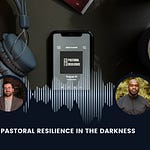Dave Wiedis J.D., M.S.C.C, is the Founder and Executive Director of ServingLeaders Ministries, and is a counselor and an attorney. He is also the Director of Counseling at Providence Church, West Chester, and has served as an adjunct professor in the graduate counseling department at Cairn University for over two decades. Dave is the author of The Spiritually Healthy Leader: Finding Freedom from Self-Sabotage. He is married to Miho Kahn, a performing and visual artist. Together they have performed Miho’s show, Clean Sheets, around the world. Dave and Miho have two adult children and live in West Chester, PA.
Find out more about David at : https://www.servingleaders.org/
Buy his book Spiritually Healthy Leadership here: Spiritually Healthy Leadership Book
Summary Of Conversation
This "Fueled Pastoral Resilience" episode, with host Dr. Raphael Mnkandhla and author Dave Wiedis (Spiritually Healthy Leader), tackles self-sabotage in ministry due to "ruling passions"—unconscious desires replacing Christ. Wiedis's "Serving Leaders Ministries" stresses pastoral care, noting how needs like affirmation become "functional idols." The discussion covers identifying these passions (often from past wounds, like Peter's hypocrisy), the danger of unawareness, and the need for honest feedback. Healing is presented as a grace-filled process of confession and repentance, confronting past traumas through God's redemptive lens to become "good stewards of our past." Both speakers share vulnerabilities, emphasizing freedom in weakness and the crucial role of community (counseling, coaching, peer groups) for leaders to process issues and align with Christ.
Key Insights
Resilience in Ministry is Essential: Ministry inevitably involves trials, tribulations, and turbulence, making resilience a crucial attribute for pastors and those in service.
Self-Sabotage is Universal: Everyone struggles with self-sabotage, driven by "ruling passions" that govern decisions and pursuits, regardless of their profession or spiritual maturity.
Ruling Passions vs. God's Supremacy: Ruling passions are deep, often unconscious desires (e.g., to be affirmed, respected, unique, or successful) that become ultimate commitments, effectively replacing Christ's supremacy in one's life and leading to self-sabotage.
Identifying Ruling Passions: Ruling passions can be identified by examining silent commitments or "vows" made (e.g., "I will never be hurt again"), reflecting on what one most passionately pursues, and seeking honest feedback about one's impact on others.
The Danger of Unawareness: Lack of awareness regarding one's ruling passions makes a leader dangerous to others, as they will unconsciously manipulate situations to satisfy these passions, potentially causing damage to relationships and ministries.
Healing and Transformation through Grace: Addressing ruling passions and past wounds requires brutal honesty and a grace-filled approach, seeing oneself through Christ's eyes rather than through shame or condemnation. It involves processing painful experiences through a redemptive, biblical lens, acknowledging God's sovereignty.
Confession as a First Step: Confession of ruling passions is a vital first step in repentance, acknowledging their impact on oneself and others, and seeking God's help to change.
Stewardship of the Past: While the past cannot be changed, it can be stewarded for God's glory. Traumatic memories can be revisited to comfort and bless others, and painful experiences can be seen as having a redemptive purpose under God's sovereign hand.
Importance of Community and Support: Leaders need safe and sacred spaces (friends, counselors, coaches, cohorts) where they can be vulnerable, receive empathetic support, and get constructive feedback to confront their blind spots and ruling passions.
Quotes
"In ministry, resilience is not optional. It is essential." (0:19)
"Who serves those who serve?" (2:59)
"When a pastor falls, think about the devastating effect. The family is affected. The church is affected. People are wounded. And also the community is affected." (5:46)
"Everybody struggles with self-sabotage. Everyone has... ruling passions that govern their lives." (7:07)
"If you take a good thing and make it an ultimate thing, it becomes an idol. It becomes sinful in our hearts." (19:38)
"A ruling passion is that which we most passionately pursue about all other things in the moment. Or a different way to say it would be a deep – sometimes it's an unconscious desire that governs our decisions, it shapes our responses, and fuels our pursuits." (13:07)
"The degree to which we are not aware of our motivations is the degree to which we can be dangerous to others." (28:06)
"Most leaders are truth starved." (33:32)
"The Bible says that a rebuke goes deeper into a wise man than a hundred blows into a fool." (35:48)
"One of the most destructive aspects of our ruling passions is if my ruling passion rules me, Jesus doesn't." (1:16:17)
"You can't change your past, but you can be a good steward of your past and use your past for the glory of God. That is huge." (1:03:00)
Takeaways
Spiritual health is deeply intertwined with understanding and addressing our core motivations and hidden desires.
True spiritual growth involves honest self-reflection and a willingness to confront uncomfortable truths about oneself, often revealed through the feedback of trusted individuals.
Repentance from ruling passions is a continuous, grace-filled process, not a one-time event, and involves a reordering of our desires to prioritize Christ's supremacy.
Past painful experiences, when viewed through God's redemptive and sovereign lens, can become powerful tools for ministry and personal growth rather than sources of shame or excuses for self-sabotage.
Seeking external support, whether from counselors, mentors, or peer groups, is not a sign of weakness but a vital step towards sustained spiritual health and resilience in ministry.
Reflection Questions
What are some "silent commitments" or "vows" that I may have made, consciously or unconsciously, that might be acting as ruling passions in my life?
In what areas of my life or ministry do I find myself most passionately pursuing something other than Christ's supremacy?
How might my desire to be affirmed, respected, unique, or in control be subtly sabotaging my relationships or effectiveness in ministry?
Am I truly open to receiving constructive feedback from trusted friends, family, or colleagues about my impact on them? What resistance do I feel towards this?
How have past painful experiences or traumas shaped my current motivations and ruling passions? Can I begin to see these through God's redemptive lens?
What steps can I take to cultivate a "safe and sacred place" for vulnerability and honest self-reflection in my life?
How can I practice confessing my ruling passions and seeking God's grace-filled transformation in specific, practical ways?
In what ways am I trying to "fully serve God" while simultaneously holding onto an "ultimate commitment" that competes with His Lordship?1
Notes generated from the transcript by Gemini














Share this post